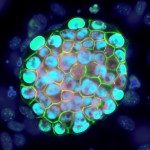Link to Pubmed [PMID] – 12383505
Gene 2002 Aug;296(1-2):75-86
The DDK syndrome is defined as the embryonic lethality of F1 mouse embryos from crosses between DDK females and males from other strains (named hereafter as non-DDK strains). Genetically controlled by the Ovum mutant (Om) locus, it is due to a deleterious interaction between a maternal factor present in DDK oocytes and the non-DDK paternal pronucleus. Therefore, the DDK syndrome constitutes a unique genetic tool to study the crucial interactions that take place between the parental genomes and the egg cytoplasm during mammalian development. In this paper, we present an extensive analysis performed by exon trapping on the Om region. Twenty-seven trapped sequences were from genes in the databases: beta-adaptin, CCT zeta2, DNA LigaseIII, Notchless, Rad51l3 and Scya1. Twenty-eight other sequences presented similarities with expressed sequence tags and genomic sequences whereas 57 did not. The pattern of expression of 37 of these markers was established. Importantly, five of them are expressed in DDK oocytes and are candidate genes for the maternal factor, and 20 are candidate genes for the paternal factor since they are expressed in testis. This data is an important step towards identifying the genes responsible for the DDK syndrome.
